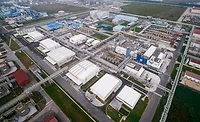BASF Opens Automotive Coatings Production Plant in Thailand

BANGKOK – BASF's Coatings division inaugurated a new automotive coatings plant at its Bangpoo manufacturing site, Samutprakarn province, Thailand. The new plant is the first BASF automotive coatings manufacturing facility in ASEAN, and will produce solventborne and waterborne automotive coatings to meet growing market demand in the region.
"BASF is a trusted partner of all major automotive manufacturers around the world, with a broad competence in all coating layers," said Dirk Bremm, President of BASF's Coatings division. "The inauguration of the new plant demonstrates our commitment to meeting customer expectations for advanced coating technologies and products in ASEAN, for ASEAN."
According to the LMC Automotive Report from November 2017, this year's total car production in ASEAN is anticipated to reach around 3.9 million. Thailand will account for more than 50% of this market, representing the largest coatings market within ASEAN, followed by Indonesia and Malaysia. With an increasing number of automotive OEMs engaging in production and technology development activities in ASEAN, there is also a growing need for local innovation in coatings solutions and products, as well as a high degree of technical service. "With our robust capabilities in Thailand, we meet the increasing demand for sustainable and eco-efficient solutions," said Peter Fischer, Senior Vice President, Coatings Solutions Asia Pacific, BASF. "Working closely with our automotive customers globally and regionally, we are committed to be the partner of choice and drive for growth and success in the highly competitive ASEAN market."
The new production plant in Bangpoo complements the facilities at the Coatings Technical Competence Center ASEAN, which was opened in September 2015 at the same location. The technical center includes a laboratory for product development, high-performance application facilities, color design, as well as a small-batch production unit. The co-location of production and technical facilities enables operational efficiency and speed to market. The new plant’s design not only allows BASF to offer customized service, it also has the potential for future expansion and the flexibility to adapt to new production requirements and changing industry trends.
Looking for a reprint of this article?
From high-res PDFs to custom plaques, order your copy today!




-(1).webp?height=200&t=1668413861&width=200)


